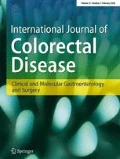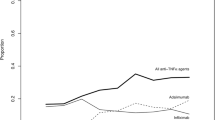Abstract
Purpose
There are no published data or guidelines on whether the same anti-tumor-necrosis factor (TNF) agents used preoperatively or different anti-TNF agents are preferable to treat postoperative recurrence. Our aim was to compare the efficacy of the consistent vs. switched anti-TNF approaches in patients with recurrent Crohn’s disease (CD) after their inception ileocolonic resection (ICR).
Methods
Patients with CD receiving anti-TNF agents before the inception ICR who were treated for clinical recurrence with the same or different anti-TNF agents after surgical resection were included in the study. The outcome of the study was the need for the subsequent resection of ileocolonic anastomosis (ICA) as calculated with survival curves.
Results
Eighty-five patients were included in the study. The mean age of the whole cohort at the inception ICR was 35.1 ± 13.5 years. The whole cohort consisted 42 (49.4 %) in the consistent group and 43 (50.6 %) in the switched group. No significant differences were observed in demographic and clinical variables between the two groups. During the median follow-up of 1.5 (interquartile range, 0.8–3.1) years, seven (16.7 %) patients in the consistent group and eight (18.6 %) in the switched group required the repeat resection of ICA. Similar results were found in terms of the subsequent resection of ICA-free survival (hazard ratio = 1.36, 95 % confidence interval 0.49–3.76, P = 0.54) between the consistent and switched groups.
Conclusions
The adherence to the same anti-TNF agent appeared to be as effective as the switching approach to different anti-TNF agent in treating postoperative recurrent CD after the inception ICR.

Similar content being viewed by others
References
Papadakis KA, Targan SR (2000) Tumor necrosis factor: biology and therapeutic inhibitors. Gastroenterology 119(4):1148–1157
Van Deventer SJ (1997) Tumour necrosis factor and Crohn's disease. Gut 40(4):443–448
Stack WA, Mann SD, Roy AJ, Heath P, Sopwith M, Freeman J, Holmes G, Long R, Forbes A, Kamm MA (1997) Randomised controlled trial of CDP571 antibody to tumour necrosis factor-alpha in Crohn's disease. Lancet 349(9051):521–524
Stidham RW, Lee TC, Higgins PD, Deshpande AR, Sussman DA, Singal AG, Elmunzer BJ, Saini SD, Vijan S, Waljee AK (2014) Systematic review with network meta-analysis: the efficacy of anti-TNF agents for the treatment of Crohn's disease. Aliment Pharmacol Ther 39(12):1349–1362. doi:10.1111/apt.12749
Targan SR, Hanauer SB, van Deventer SJ, Mayer L, Present DH, Braakman T, DeWoody KL, Schaible TF, Rutgeerts PJ (1997) A short-term study of chimeric monoclonal antibody cA2 to tumor necrosis factor alpha for Crohn's disease. Crohn's disease cA2 study group. N Engl J Med 337(15):1029–1035. doi:10.1056/NEJM199710093371502
Hanauer SB, Feagan BG, Lichtenstein GR, Mayer LF, Schreiber S, Colombel JF, Rachmilewitz D, Wolf DC, Olson A, Bao W, Rutgeerts P (2002) Maintenance infliximab for Crohn's disease: the ACCENT I randomised trial. Lancet 359(9317):1541–1549. doi:10.1016/S0140-6736(02)08512-4
Ricart E, Sandborn WJ (1999) Infliximab for the treatment of fistulas in patients with Crohn's disease. Gastroenterology 117(5):1247–1248
Present DH, Rutgeerts P, Targan S, Hanauer SB, Mayer L, van Hogezand RA, Podolsky DK, Sands BE, Braakman T, DeWoody KL, Schaible TF, van Deventer SJ (1999) Infliximab for the treatment of fistulas in patients with Crohn's disease. N Engl J Med 340(18):1398–1405. doi:10.1056/NEJM199905063401804
Akobeng AA, Sandborn WJ, Bickston SJ, Chande N, Shackelton LM, Nelson S, Feagan BG (2014) Tumor necrosis factor-alpha antagonists twenty years later: what do Cochrane reviews tell us? Inflamm Bowel Dis 20(11):2132–2141. doi:10.1097/MIB.0000000000000218
Su CG, Lichtenstein GR (2003) Influence of immunogenicity on the long-term efficacy of infliximab in Crohn's disease. Gastroenterology 125(5):1544–1546
Baert F, Noman M, Vermeire S, Van Assche G, D’Haens G, Carbonez A, Rutgeerts P (2003) Influence of immunogenicity on the long-term efficacy of infliximab in Crohn's disease. N Engl J Med 348(7):601–608. doi:10.1056/NEJMoa020888
Farrell RJ, Alsahli M, Jeen YT, Falchuk KR, Peppercorn MA, Michetti P (2003) Intravenous hydrocortisone premedication reduces antibodies to infliximab in Crohn's disease: a randomized controlled trial. Gastroenterology 124(4):917–924. doi:10.1053/gast.2003.50145
Hanauer SB, Wagner CL, Bala M, Mayer L, Travers S, Diamond RH, Olson A, Bao W, Rutgeerts P (2004) Incidence and importance of antibody responses to infliximab after maintenance or episodic treatment in Crohn's disease. Clin Gastroenterol Hepatol 2(7):542–553
Cheifetz A, Smedley M, Martin S, Reiter M, Leone G, Mayer L, Plevy S (2003) The incidence and management of infusion reactions to infliximab: a large center experience. Am J Gastroenterol 98(6):1315–1324. doi:10.1111/j.1572-0241.2003.07457.x
Bartelds GM, Krieckaert CL, Nurmohamed MT, van Schouwenburg PA, Lems WF, Twisk JW, Dijkmans BA, Aarden L, Wolbink GJ (2011) Development of antidrug antibodies against adalimumab and association with disease activity and treatment failure during long-term follow-up. JAMA 305(14):1460–1468. doi:10.1001/jama.2011.406
Colombel JF, Feagan BG, Sandborn WJ, Van Assche G, Robinson AM (2012) Therapeutic drug monitoring of biologics for inflammatory bowel disease. Inflamm Bowel Dis 18(2):349–358. doi:10.1002/ibd.21831
Sandborn WJ, Rutgeerts P, Enns R, Hanauer SB, Colombel JF, Panaccione R, D'Haens G, Li J, Rosenfeld MR, Kent JD, Pollack PF (2007) Adalimumab induction therapy for Crohn disease previously treated with infliximab: a randomized trial. Ann Intern Med 146(12):829–838
Sandborn WJ, Abreu MT, D'Haens G, Colombel JF, Vermeire S, Mitchev K, Jamoul C, Fedorak RN, Spehlmann ME, Wolf DC, Lee S, Rutgeerts P (2010) Certolizumab pegol in patients with moderate to severe Crohn's disease and secondary failure to infliximab. Clin Gastroenterol Hepatol 8(8):688–695 e682. doi:10.1016/j.cgh.2010.04.021
Sands BE, Feagan BG, Rutgeerts P, Colombel JF, Sandborn WJ, Sy R, D'Haens G, Ben-Horin S, Xu J, Rosario M, Fox I, Parikh A, Milch C, Hanauer S (2014) Effects of vedolizumab induction therapy for patients with Crohn's disease in whom tumor necrosis factor antagonist treatment failed. Gastroenterology 147(3):618–627 e613. doi:10.1053/j.gastro.2014.05.008
de Silva PS, Nguyen DD, Sauk J, Korzenik J, Yajnik V, Ananthakrishnan AN (2012) Long-term outcome of a third anti-TNF monoclonal antibody after the failure of two prior anti-TNFs in inflammatory bowel disease. Aliment Pharmacol Ther 36(5):459–466. doi:10.1111/j.1365-2036.2012.05214.x
Van Assche G, Vermeire S, Ballet V, Gabriels F, Noman M, D'Haens G, Claessens C, Humblet E, Vande Casteele N, Gils A, Rutgeerts P (2012) Switch to adalimumab in patients with Crohn's disease controlled by maintenance infliximab: prospective randomised SWITCH trial. Gut 61(2):229–234. doi:10.1136/gutjnl-2011-300755
Buisson A, Chevaux JB, Allen PB, Bommelaer G, Peyrin-Biroulet L (2012) Review article: the natural history of postoperative Crohn's disease recurrence. Aliment Pharmacol Ther 35(6):625–633. doi:10.1111/j.1365-2036.2012.05002.x
Lemann M (2006) Review article: can post-operative recurrence in Crohn's disease be prevented? Aliment Pharmacol Ther 24(Suppl 3):22–28. doi:10.1111/j.1365-2036.2006.03055.x
Rutgeerts P (2006) Review article: recurrence of Crohn's disease after surgery—the need for treatment of new lesions. Aliment Pharmacol Ther 24(Suppl 3):29–32. doi:10.1111/j.1365-2036.2006.03056.x
Satsangi J, Silverberg MS, Vermeire S, Colombel JF (2006) The Montreal classification of inflammatory bowel disease: controversies, consensus, and implications. Gut 55(6):749–753. doi:10.1136/gut.2005.082909
Sokol H, Polin V, Lavergne-Slove A, Panis Y, Treton X, Dray X, Bouhnik Y, Valleur P, Marteau P (2009) Plexitis as a predictive factor of early postoperative clinical recurrence in Crohn's disease. Gut 58(9):1218–1225. doi:10.1136/gut.2009.177782
Sandborn WJ, Feagan BG, Hanauer SB, Present DH, Sutherland LR, Kamm MA, Wolf DC, Baker JP, Hawkey C, Archambault A, Bernstein CN, Novak C, Heath PK, Targan SR (2001) An engineered human antibody to TNF (CDP571) for active Crohn's disease: a randomized double-blind placebo-controlled trial. Gastroenterology 120(6):1330–1338
Sandborn WJ, Feagan BG, Stoinov S, Honiball PJ, Rutgeerts P, Mason D, Bloomfield R, Schreiber S (2007) Certolizumab pegol for the treatment of Crohn's disease. N Engl J Med 357(3):228–238. doi:10.1056/NEJMoa067594
Sandborn WJ, Feagan BG, Radford-Smith G, Kovacs A, Enns R, Innes A, Patel J (2004) CDP571, a humanised monoclonal antibody to tumour necrosis factor alpha, for moderate to severe Crohn's disease: a randomised, double blind, placebo controlled trial. Gut 53(10):1485–1493. doi:10.1136/gut.2003.035253
Peyrin-Biroulet L, Deltenre P, de Suray N, Branche J, Sandborn WJ, Colombel JF (2008) Efficacy and safety of tumor necrosis factor antagonists in Crohn's disease: meta-analysis of placebo-controlled trials. Clin Gastroenterol Hepatol 6(6):644–653. doi:10.1016/j.cgh.2008.03.014
Hanauer SB (2004) Efficacy and safety of tumor necrosis factor antagonists in Crohn's disease: overview of randomized clinical studies. Rev Gastroenterol Disord 4(Suppl 3):S18–S24
Nanda KS, Cheifetz AS, Moss AC (2013) Impact of antibodies to infliximab on clinical outcomes and serum infliximab levels in patients with inflammatory bowel disease (IBD): a meta-analysis. Am J Gastroenterol 108(1):40–47 . doi:10.1038/ajg.2012.363quiz 48
Ordas I, Feagan BG, Sandborn WJ (2012) Therapeutic drug monitoring of tumor necrosis factor antagonists in inflammatory bowel disease. Clin Gastroenterol Hepatol 10(10):1079–1087 . doi:10.1016/j.cgh.2012.06.032quiz e1085-1076
Miheller P, Kiss LS, Lorinczy K, Lakatos PL (2012) Anti-TNF trough levels and detection of antibodies to anti-TNF in inflammatory bowel disease: are they ready for everyday clinical use? Expert Opin Biol Ther 12(2):179–192. doi:10.1517/14712598.2012.644271
Regueiro M, Schraut W, Baidoo L, Kip KE, Sepulveda AR, Pesci M, Harrison J, Plevy SE (2009) Infliximab prevents Crohn's disease recurrence after ileal resection. Gastroenterology 136(2):441–450 e441 . doi:10.1053/j.gastro.2008.10.051quiz 716
Acknowledgments
Yi Li MD is a research fellow currently at the Department of General Surgery, Jinling Hospital, Medical School of Nanjing University, Nanjing, China. Dr. Bo Shen is supported by the Ed and Joey Story Endowed Chair.
Author contributions
YL and YR contributed to study concept and design, acquisition, analysis and interpretation of data, and drafting of the manuscript. YL, LS, and BS contributed to study concept and design, interpretation of data, and critical revision of the manuscript for important intellectual content. BS, FR, and LS supervised the study. All authors read and approved the final manuscript.
Author information
Authors and Affiliations
Corresponding author
Ethics declarations
Disclosure
The authors declared no personal or financial conflict of interest. Dr. Bo Shen is a consultant for Jassen and Abbvie.
Additional information
What does this paper add to the literature?
The same anti-TNF agents used preoperatively is comparable with the different anti-TNF agents in treating postoperative recurrence of Crohn’s disease.
Rights and permissions
About this article
Cite this article
Li, Y., Stocchi, L., Rui, Y. et al. Comparable outcomes of the consistent use versus switched use of anti- tumor necrosis factor agents in postoperative recurrent Crohn’s disease following ileocolonic resection. Int J Colorectal Dis 31, 1751–1758 (2016). https://doi.org/10.1007/s00384-016-2632-4
Accepted:
Published:
Issue Date:
DOI: https://doi.org/10.1007/s00384-016-2632-4




